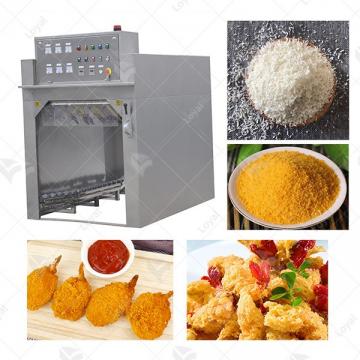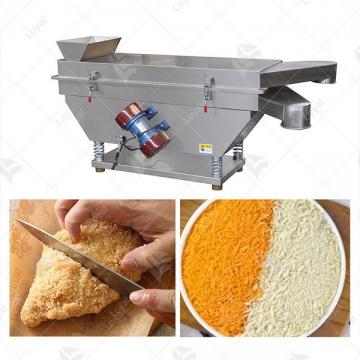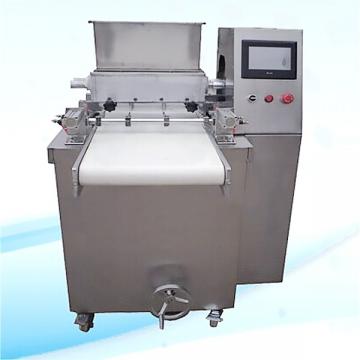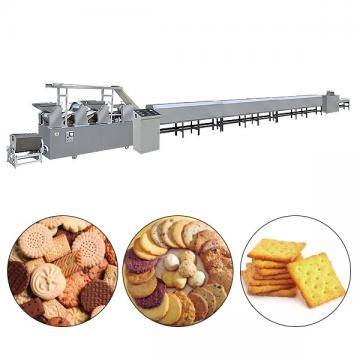
- Shandong Loyal Industrial Co.,Ltd.
- Macaroni Production Machine Instant Noodle Machine Biscuit Making Machine
Home> Company News> The Ultimate Guide to Panko Bread Crumb Japanese Style Electrical Baking Bread Mould Cart in 2024

The Ultimate Guide to Panko Bread Crumb Japanese Style Electrical Baking Bread Mould Cart in 2024
2024-06-26 10:09:21Introduction
In 2024, the world of industrial food machinery continues to evolve, driven by advancements in technology and growing consumer demand for high-quality products. One area that has seen significant development is the production of Panko bread crumbs, a staple in Japanese cuisine known for their light, airy texture and superior crispiness. The integration of electrical baking technology and specialized bread mould carts has revolutionized the way these bread crumbs are produced, ensuring consistency, efficiency, and scalability in industrial settings.
Panko bread crumbs originated in Japan and have become a global culinary phenomenon. Unlike traditional bread crumbs, Panko is made from bread that is baked by passing an electrical current through the dough, resulting in a crustless loaf that is then ground into large, flaky crumbs. This unique process gives Panko its distinctive texture, which is highly prized in a variety of dishes, from tempura to tonkatsu.
The advent of electrical baking machines has further enhanced the production of Panko bread crumbs. These machines offer precise temperature control, consistent baking results, and increased production speed, making them indispensable in modern bakeries. When paired with bread mould carts, which are designed to hold and shape dough during the baking process, these machines ensure that every batch of Panko bread crumbs meets the highest standards of quality and uniformity.

Distinguishing features of Panko bread crumbs compared to other bread crumbs
Panko bread crumbs are distinct from traditional bread crumbs due to their unique texture, production method, and culinary applications. Originating in Japan, Panko is celebrated for its light, airy, and crispy characteristics, which are achieved through a specialized baking process involving electrical baking technology.
Unique Texture and Appearance
The most notable feature of Panko bread crumbs is their large, flaky texture. Unlike traditional bread crumbs that are typically fine and granular, Panko crumbs are coarse and irregularly shaped. This structure creates a light and crispy coating when used in frying or baking, making Panko ideal for achieving a perfect crunch in dishes such as tempura, tonkatsu, and various breaded seafood.
Production Method
Traditional bread crumbs are usually made by grinding toasted or dried bread. In contrast, Panko is produced using an electrical baking process that involves passing an electric current through the dough. This method, which differs significantly from conventional baking, results in a crustless loaf that is then ground into the characteristic large flakes. The use of bread mould carts in this process ensures uniformity and consistency in the shape and size of the crumbs, enhancing the quality and performance of the final product.
Culinary Applications
The unique properties of Panko bread crumbs make them highly versatile in culinary applications. Their ability to stay crisp for longer periods and absorb less oil compared to traditional bread crumbs makes them a preferred choice for chefs and home cooks alike. Panko is commonly used in Japanese cuisine, but its popularity has spread globally, finding its way into a variety of dishes that benefit from a crispy texture.

Advancements in Electrical Baking Technology
|
Aspect |
Description |
|
Precision Control |
Modern electrical baking technology provides precise temperature and humidity control, ensuring consistent results in the production of Panko bread crumbs. This level of control is crucial for maintaining the quality and texture that distinguishes Panko from other bread crumbs. |
|
Energy Efficiency |
New advancements in electrical baking equipment focus on energy efficiency, reducing operational costs while maintaining high production standards. Efficient energy use also aligns with sustainable manufacturing practices. |
|
Automated Processes |
Integration of automation in electrical baking allows for seamless operation and monitoring. Automated systems manage baking times, temperatures, and even the operation of bread mould carts, enhancing productivity and reducing the risk of human error. |
|
Uniformity and Consistency |
Electrical baking machines are designed to work in tandem with bread mould carts, ensuring uniform dough shaping and consistent baking outcomes. This synergy is essential for producing Panko bread crumbs with the desired texture and quality. |
|
Advanced Materials |
The use of advanced materials in the construction of electrical baking machines improves durability and heat distribution. These materials also contribute to better hygiene and easier maintenance, which are critical in food production environments. |
|
Real-Time Monitoring |
State-of-the-art electrical baking technology includes real-time monitoring and data analytics, allowing operators to make immediate adjustments and maintain optimal baking conditions. This capability ensures that every batch of Panko bread crumbs meets the highest standards. |
|
Safety Features |
Enhanced safety features in modern electrical baking equipment protect operators and reduce the risk of accidents. These features include automatic shut-offs, temperature alarms, and protective barriers, ensuring a safe working environment. |

Benefits of using electrical baking technology for bread production
|
Benefit |
Description |
|
Enhanced Precision |
Electrical baking technology offers precise control over temperature and humidity, ensuring consistent baking results. This precision is crucial for producing high-quality Panko bread crumbs with the desired texture and uniformity. |
|
Energy Efficiency |
Modern electrical baking machines are designed to be energy-efficient, reducing operational costs and environmental impact. Improved energy management helps bakeries maintain sustainable practices while optimizing production. |
|
Consistency and Quality |
The use of electrical baking ensures that each batch of bread, including Panko bread crumbs, is baked to perfection with minimal variability. This consistency is vital for meeting quality standards and customer expectations. |
|
Automation and Control |
Advanced electrical baking equipment often includes automated controls and monitoring systems, which streamline the baking process and reduce the need for manual intervention. Automation enhances productivity and minimizes human error. |
|
Integration with Bread Mould Carts |
Electrical baking machines can be seamlessly integrated with bread mould carts, allowing for uniform shaping and baking of dough. This integration is essential for maintaining the quality and consistency of Japanese-style bread products. |
|
Improved Safety |
Enhanced safety features in electrical baking equipment, such as automatic shut-offs and temperature alarms, protect operators and reduce the risk of accidents. Safety improvements contribute to a safer working environment. |
|
Scalability |
Electrical baking technology supports scalable production, enabling bakeries to increase output without compromising on quality. This scalability is particularly important for meeting the growing demand for Panko bread crumbs in various markets. |
|
Real-Time Monitoring |
The ability to monitor baking conditions in real-time allows operators to make immediate adjustments, ensuring optimal baking conditions at all times. Real-time monitoring helps maintain high production standards and efficiency. |

Key Features to Look for in Electrical Baking Machines
When selecting electrical baking machines for producing Panko bread crumbs and other Japanese-style bread products, it is essential to consider several key features that ensure efficiency, quality, and consistency.
1. Precise Temperature Control
Ensures consistent baking results, crucial for producing high-quality Panko bread crumbs.
Allows for precise adjustments to achieve the ideal texture and color of the bread.
2. Uniform Heat Distribution
Guarantees even baking throughout the entire batch.
Prevents hotspots and ensures that all bread moulds are baked uniformly.
3. Energy Efficiency
Reduces operational costs and environmental impact.
Modern electrical baking machines are designed to consume less energy while maintaining high performance.
4. Automated Controls and Monitoring
Facilitates easy operation with minimal manual intervention.
Includes features like programmable settings, real-time monitoring, and automated alerts to ensure optimal baking conditions.
5. Integration with Bread Mould Carts
Seamlessly compatible with bread mould carts to ensure uniform shaping and baking of dough.
Enhances the overall efficiency of the baking process and maintains the consistency of Panko bread crumbs.
6. Durable Construction Materials
Made from high-quality, heat-resistant materials for longevity and reliability.
Ensures that the machine can withstand the rigors of continuous industrial use.
7. Safety Features
Includes automatic shut-off, temperature alarms, and protective barriers to ensure operator safety.
Reduces the risk of accidents and equipment damage.
8. Easy Maintenance and Cleaning
Designed for quick and thorough cleaning to maintain hygiene standards.
Easy maintenance procedures to reduce downtime and extend the lifespan of the machine.

The Role of Bread Mould Carts
Bread mould carts are essential components in the production of Panko bread crumbs and other Japanese-style bread products. Their role in the baking process is multifaceted, contributing to efficiency, consistency, and overall quality.
Uniform Shaping and Size
Bread mould carts ensure that each dough piece is uniformly shaped and sized before baking. This uniformity is crucial for producing Panko bread crumbs with consistent texture and quality. The carts help maintain the integrity of the dough, preventing deformation during the baking process.
Enhanced Efficiency
In industrial settings, bread mould carts significantly enhance production efficiency. By organizing and transporting multiple dough pieces simultaneously, they streamline the workflow and reduce the time and labor required for manual handling. This efficiency is vital for meeting high production demands, especially in large-scale operations.
Integration with Electrical Baking Machines
Bread mould carts are designed to integrate seamlessly with electrical baking machines. This compatibility ensures that the dough is evenly exposed to heat, resulting in consistent baking outcomes. The carts' design allows for optimal air circulation and heat distribution, which is essential for achieving the desired characteristics of Panko bread crumbs.
Quality Control
Using bread mould carts also improves quality control during the baking process. The standardized shapes and sizes facilitated by the carts help in producing uniform Panko bread crumbs, which is a critical quality parameter. Consistency in product quality enhances customer satisfaction and compliance with industry standards.
Durability and Hygiene
Modern bread mould carts are constructed from durable, food-grade materials that withstand the rigors of industrial use. They are designed for easy cleaning and maintenance, which is crucial for maintaining hygiene standards in food production. The carts' materials and design prevent contamination and ensure a safe production environment.
Versatility
While primarily used for producing Panko bread crumbs, bread mould carts are versatile and can be adapted for various other bread products. This versatility makes them a valuable investment for bakeries looking to diversify their product offerings without the need for additional specialized equipment.

Innovative Uses of Bread Mould Carts in Japanese-Style Baking
Bread mould carts have become indispensable in the production of Panko bread crumbs and other Japanese-style baked goods. These carts offer innovative solutions that enhance the efficiency and quality of baking processes. Here are some innovative uses of bread mould carts in Japanese-style baking:
Uniform Dough Shaping and Proofing
Bread mould carts are essential for uniformly shaping and proofing dough. By holding the dough in specific moulds, these carts ensure that each piece maintains its shape and size, which is crucial for producing consistent Panko bread crumbs. The even shaping leads to uniform baking, which is key in achieving the desired texture and quality.
Streamlined Baking Process
In large-scale baking operations, bread mould carts streamline the process by allowing multiple batches to be baked simultaneously. This not only increases productivity but also ensures that all pieces are baked under the same conditions, resulting in uniform Japanese-style baked goods. The carts facilitate easy loading and unloading of dough, reducing manual labor and time.
Enhanced Air Circulation
The design of bread mould carts promotes optimal air circulation around each piece of dough. This feature is particularly beneficial in electrical baking ovens, where consistent air flow ensures even baking. Enhanced air circulation helps in achieving the light, airy texture characteristic of Panko bread crumbs.
Multi-Functional Use
Bread mould carts are versatile and can be used for various types of Japanese-style bread products beyond Panko crumbs. For example, they can be adapted for making bread rolls, buns, and specialty loaves. This versatility allows bakeries to diversify their product range without investing in additional equipment.
Improved Hygiene and Safety
Constructed from durable, food-grade materials, modern bread mould carts are easy to clean and maintain, ensuring high hygiene standards. Their design minimizes contamination risks, which is crucial in food production. Additionally, their sturdy construction provides a safe working environment by reducing the risk of accidents associated with manual handling.
Consistency in Quality
Using bread mould carts ensures that each batch of dough undergoes the same treatment, from proofing to baking. This consistency is vital for maintaining the high quality of Japanese-style baked goods. Customers expect uniformity in products like Panko bread crumbs, and bread mould carts help meet these expectations reliably.

Maintenance and Troubleshooting
Effective maintenance and troubleshooting are critical for ensuring the longevity and optimal performance of electrical baking machines and bread mould carts used in the production of Panko bread crumbs and other Japanese-style baked goods. Here are key practices and solutions to common issues:
1. Routine Cleaning
Clean bread mould carts and baking machines daily to prevent dough buildup and contamination.
Use food-safe cleaning agents to ensure hygiene and safety.
2. Inspection of Components
Regularly inspect heating elements, temperature sensors, and electrical connections in baking machines.
Check bread mould carts for wear and tear, and ensure all parts are intact and functioning properly.
3. Lubrication
Lubricate moving parts of both electrical baking machines and bread mould carts to prevent mechanical wear.
Use food-grade lubricants to ensure safety and compliance with food industry standards.
4. Calibration
Periodically calibrate temperature controls and sensors in electrical baking machines to maintain precise baking conditions.
Ensure that bread mould carts are properly aligned to maintain uniform dough shaping.
Troubleshooting Common Issues
1. Inconsistent Baking Results
Problem: Uneven baking or irregular texture in Panko bread crumbs.
Solution: Check and clean heating elements; recalibrate temperature sensors; ensure proper air circulation by not overcrowding the baking chamber.
2. Mechanical Failures
Problem: Malfunctioning components in electrical baking machines or bread mould carts.
Solution: Inspect and replace damaged parts; ensure regular lubrication; consult the manufacturer’s guide for specific repair instructions.
3. Electrical Issues
Problem: Power surges or electrical failures affecting baking machines.
Solution: Verify the integrity of electrical connections and circuits; use surge protectors; conduct regular electrical safety checks.
4. Dough Sticking
Problem: Dough sticking to bread mould carts, affecting shape and baking quality.
Solution: Apply a light coating of release agent to the moulds; ensure moulds are clean and free of residues.
5. Temperature Fluctuations
Problem: Inconsistent temperature leading to uneven baking.
Solution: Regularly calibrate temperature controls; inspect and clean temperature sensors; ensure doors and seals are intact and functioning properly.

References
The following are five authoritative foreign literature websites in the field of industrial breadcrumb maker:
1. IEEE Xplore Digital Library
Website: [https://ieeexplore.ieee.org/]
2.ScienceDirect
Website: [https://www.sciencedirect.com/]
3. SpringerLink
Website: [https://link.springer.com/]
4. Google Scholar
Website: [https://scholar.google.com/]
5. PubMed
Website: [https://pubmed.ncbi.nlm.nih.gov/]
 Commercial Japanese Panko Bread Crumb Grinder Machine
Commercial Japanese Panko Bread Crumb Grinder Machine Japanese Bread Crumbs Processing Line
Japanese Bread Crumbs Processing Line Automatic Cookies Making Machines
Automatic Cookies Making Machines Fully Automatic Biscuit Making Machines
Fully Automatic Biscuit Making Machines